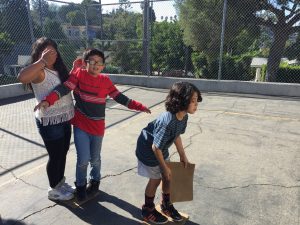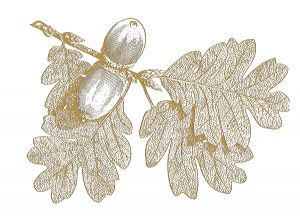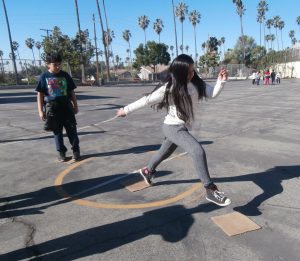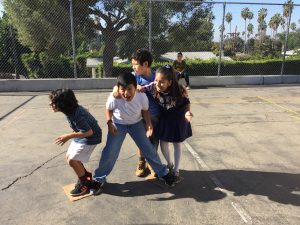There’s a team-building game that we play with kids in our Full Circle program called Toxic Swamp.
The apocalyptic scenario we present to the group is that there’s a cure for cancer in a plant that grows on an island in a toxic swamp. And the only way to reach the island is by stepping on “magic lily pads” (1’ x 1’ carpet squares) to cross.
The “island” is usually a tree or lamppost about 30 feet from the starting point.
The group is given a stack of lily pads and charged with reaching the island and bringing the cure back to save humanity. Everyone has to cross and everyone has to come back.
However, there are two fewer magic lily pads than the number of kids.
So, the group has to strategize about how they will work together to get through this challenge. There’s usually a bit of trial and error, and sometimes a fair amount of conflict before they arrive at a successful plan.
 The attempts usually start with one of the more assertive students seizing the reins and tossing one of the lily pads far out into the swamp and then leaping onto it, without much thought about what they’re going to do next, or about the kids that they’ve left behind that may not be able to jump as far as they have.
The attempts usually start with one of the more assertive students seizing the reins and tossing one of the lily pads far out into the swamp and then leaping onto it, without much thought about what they’re going to do next, or about the kids that they’ve left behind that may not be able to jump as far as they have.
And these magic lily pads will dissolve if they are without human contact for more than three seconds. So, if they are out of arm’s reach, they vanish. Even though the instructor is loudly counting “1… 2…” the groups usually lose at least one before they learn the lesson.
And there’s more. If one of the kids happens to lose their balance and slip off the lily pad, their foot is burned so badly that they have to make the rest of the journey on one leg.
Other times, a roughly tossed lily pad might result is a splash of the toxic material into the eyes of one of the kids, blinding them. They have to cross blindfolded, guided by one of the other students.
And that’s my point, actually. Something that’s been proven to me over and over again, watching this game play out for more than 20 years now. The end result is always the same.
Regardless of the degree of conflict among the group, and regardless of the number of attempts or the number of strategies, sooner or later, these ten-year-olds work it out. Every. Single. Time.
And those kids that have been “blinded” or “injured,” are helped –and sometimes carried– across with the rest of the group. Everyone has to cross and everyone has to come back.

That game has been on my mind a lot in the past couple of weeks.
We seem to all be floating in this toxic swamp (coronavirus), clinging to our magic lily pads of self-isolation. And frankly, according to the experts, that’s the best thing we can do to flatten the curve and slow the spread of this thing.
What I have been inspired by, surprisingly, is the outpouring of positivity online and the demonstration of the human spirit and our resiliency in social media. What is often the place of divisiveness where folks reveal the worst of themselves, is also serving as a place of healing and connection.
From the ever-growing number of “living room concerts” to John Krasinski’s “Some Good News” (see it if you haven’t) to service groups that are popping up to meet the needs of residents most at-risk (Zoomer to Boomer is my favorite), I am inspired beyond belief by the resiliency and sense of community that we are exhibiting. We get through this thing together. Some of us may need more help than others. Some of us may even need to be carried. That’s okay. Everyone has to cross and everyone has to come back.
We always say that the real “gold” to be mined is in the debriefing and processing of the experience with the kids. The sense-making matters more than the experience itself. What went wrong? What went right? What could we do better? What are the lessons learned? What is the takeaway?
Unfortunately, we’re not yet at that point in this current toxic swamp. We’re still getting through it.


Here at Wildwoods, we’re doing what we can, offering up our Nature Rescue Squad – weekly nature-connection activities for homebound kids of all ages. Think of it as our “virtual” magic lily pad.
Of course, we look forward to the day that we can get back in the classroom with kids, and back in the parks with busloads of families, but for now, we connect with them on screen. In all honesty, that connection is just as much for us as it is them.
And I look forward to the coming months when we have the opportunity to begin the sense-making part of this experience. I believe it will be an opportunity to “reset” such as we have never had.
I’m sure you’ve seen the images and new stories about cleaner air and cleaner water all over the globe because of the cessation of the majority of human travel. And I would wager that we’re seeing similar “psychic cleaning” (if we’re able to turn off cable news, that is) because of the focus that is allowed by our reduced movement and distraction.
In fact, writer/director Julio Vincent summed up this opportunity beautifully in a recent piece that has gone viral:
I hope you might consider this: What happened is inexplicably incredible. It’s the greatest gift ever unwrapped. Not the deaths, not the virus, but The Great Pause. It is, in a word, profound.
…
What the crisis has given us is a once-in-a-lifetime chance to see ourselves and our country in the plainest of views. At no other time, ever in our lives, have we gotten the opportunity to see what would happen if the world simply stopped. Here it is. We’re in it.
…
We are a good people. And as a good people, we want to define — on our own terms — what this country looks like in five, 10, 50 years. This is our chance to do that, the biggest one we have ever gotten. And the best one we’ll ever get.
…
If we want cleaner air, we can make it happen. If we want to protect our doctors and nurses from the next virus — and protect all Americans — we can make it happen. If we want our neighbors and friends to earn a dignified income, we can make that happen. If we want millions of kids to be able to eat if suddenly their school is closed, we can make that happen. And, yes, if we just want to live a simpler life, we can make that happen, too.
 So, I would like to think that this is our opportunity to come together and figure out how to navigate not only the current toxic swamp of coronavirus but also the toxic swamp of our inequitable society and rampant consumption that is poisoning our planet. I hope it is.
So, I would like to think that this is our opportunity to come together and figure out how to navigate not only the current toxic swamp of coronavirus but also the toxic swamp of our inequitable society and rampant consumption that is poisoning our planet. I hope it is.
I hope that we can all somehow find our inner 10-year-old and work this out. We can share our magic lily pads because it should be obvious by now that we’ve got enough to make it work.
Everyone has to cross and everyone has to come back.